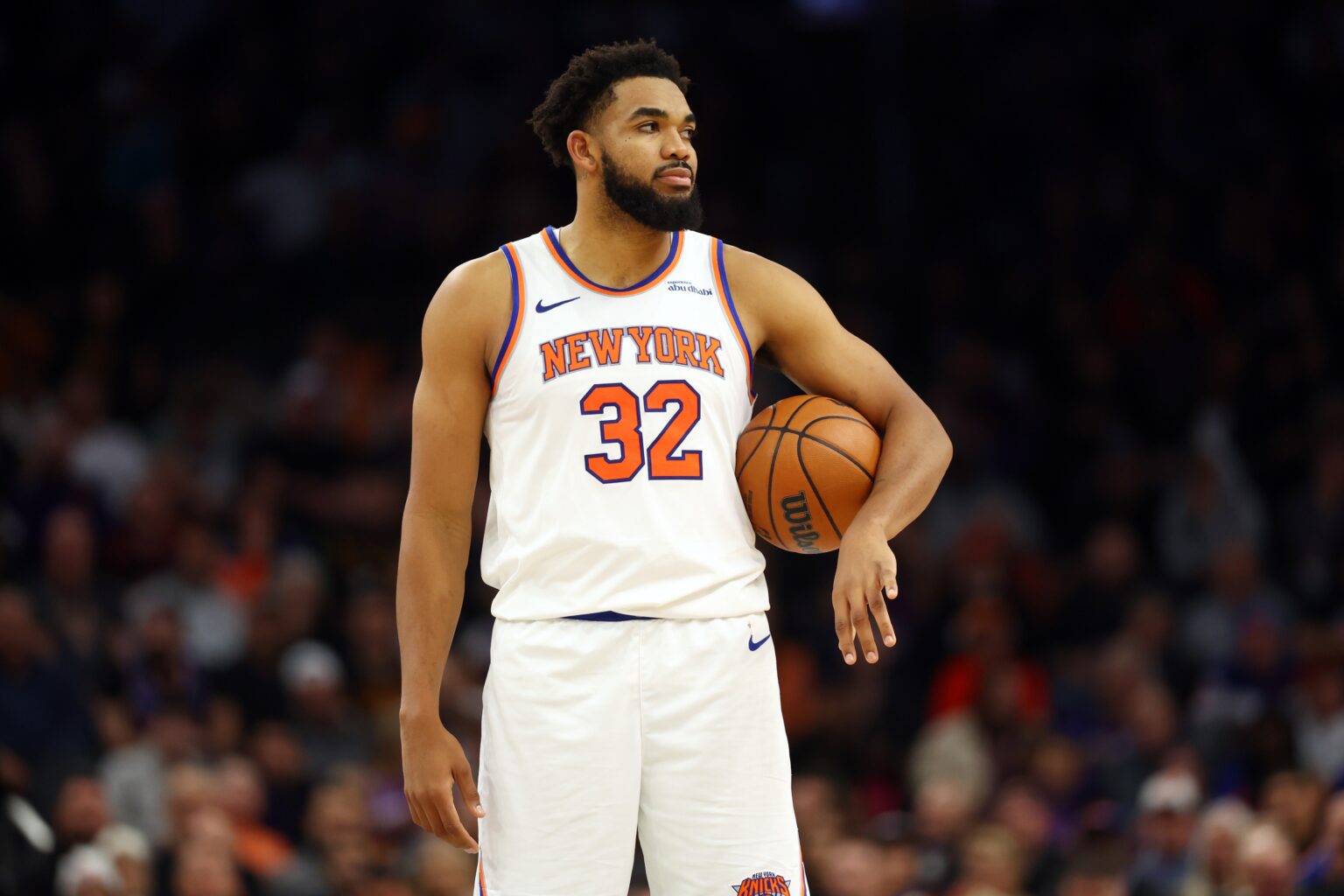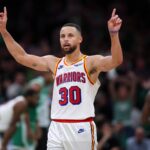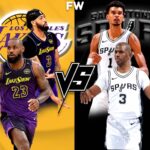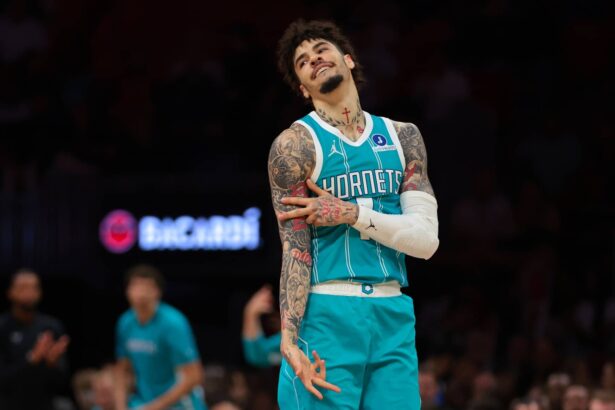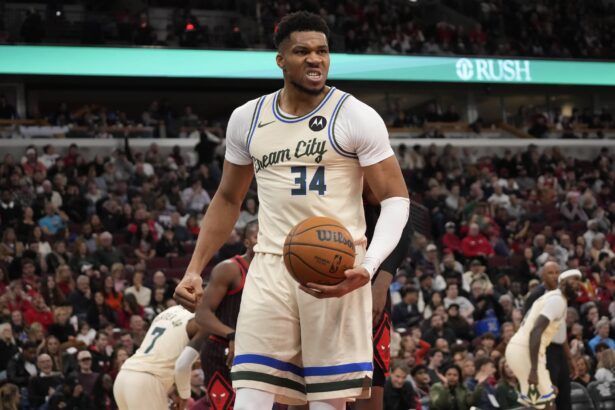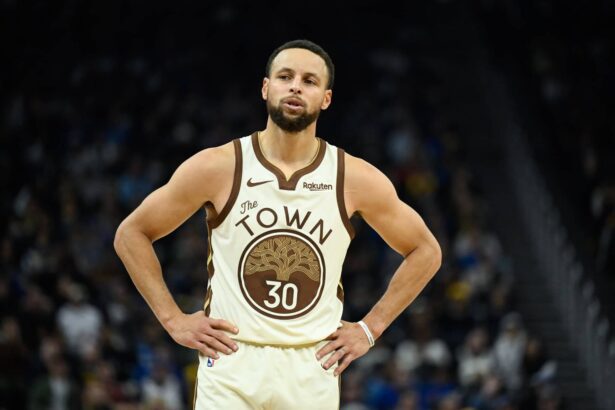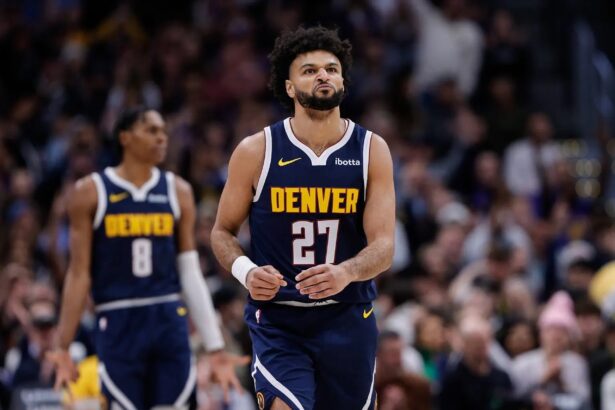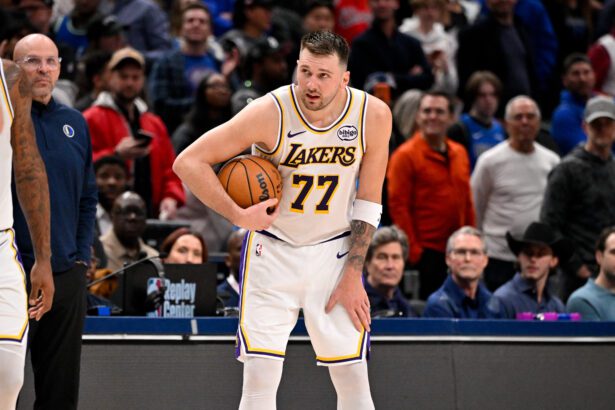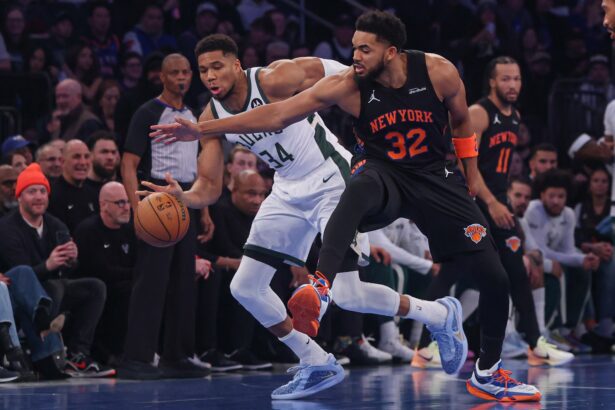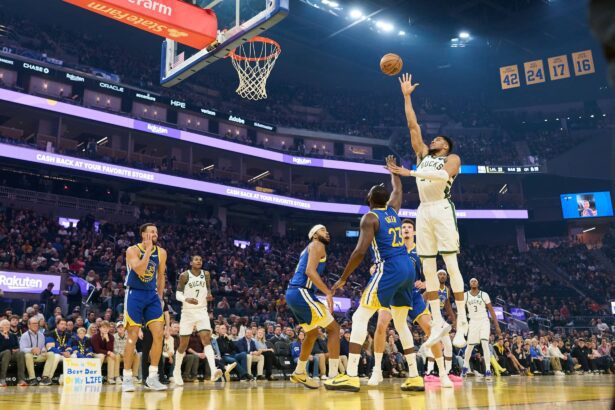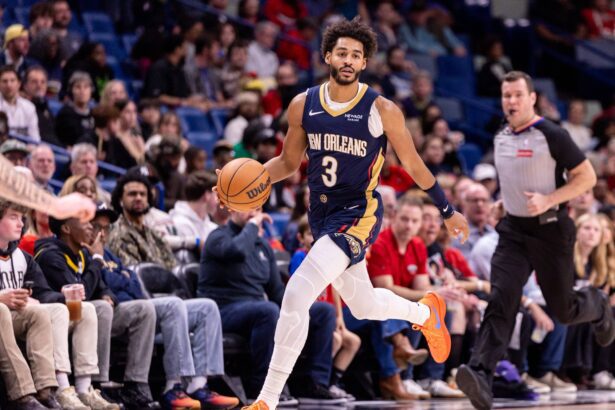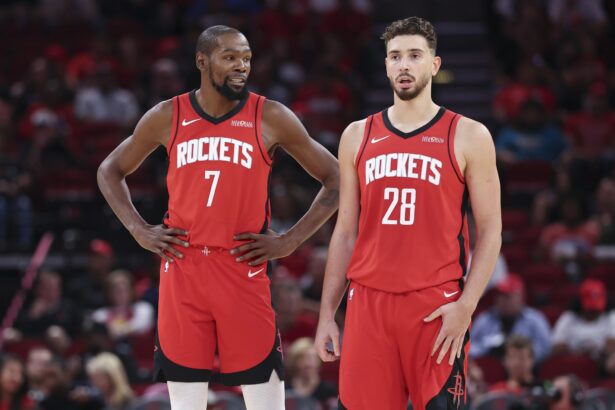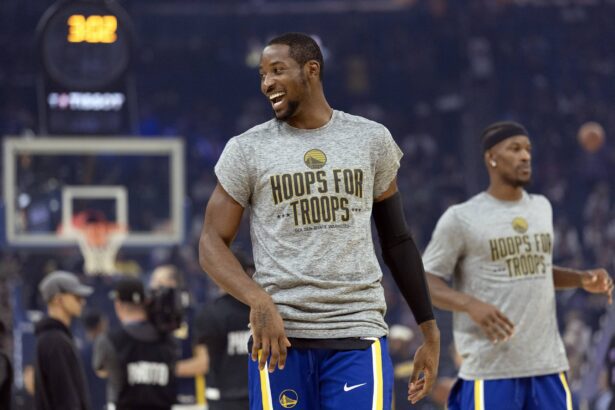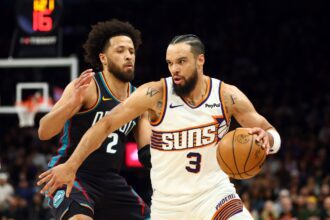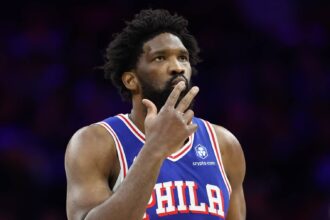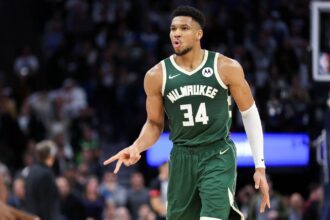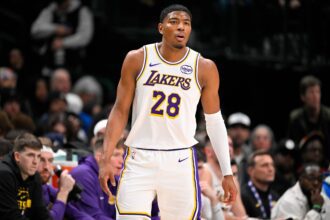Just months after reaching the Western Conference Finals with Karl-Anthony Towns leading the charge, the Timberwolves made a head-scratching decision by trading their franchise cornerstone to the Knicks. In return, they received Julius Randle and Donte DiVincenzo, both of whom have struggled to find their footing in Minnesota.
Meanwhile, the Timberwolves chose to retain Naz Reid and Jaden McDaniels, who would’ve been most likely traded in the future due to cap space constraints. Reid, secured on a three-year, $42 million deal in 2023, has been an amazing Sixth Man, while McDaniels, with his $136 million extension in the same offseason, continues to showcase elite defensive skills. But neither player matches the offensive prowess and versatility that Towns brought to the team.
This move, aimed at financial future flexibility, has yet to translate into on-court success. The Timberwolves currently sit at 8-9, 11th in the Western Conference, while the Knicks, bolstered by Towns’ 26.3 points per game, hold a 10-7 record, placing them 4th in the East. The decision to part ways with Towns so soon after a deep playoff run raises serious questions about the franchise’s direction and priorities.
Towns And Edwards Were A Great Duo About To Take Off
When Anthony Edwards arrived in Minnesota, it felt like the Timberwolves finally had their franchise centerpiece—and pairing him with Karl-Anthony Towns just made everything click. These two didn’t just coexist; they thrived together. In the three straight postseasons they led the team to, their on-court chemistry was undeniable, and their off-court bond only made it better.
Last season, Edwards officially took the torch as the team’s top scorer, and Towns didn’t just step aside—he leaned into his role as the ultimate second option. The numbers backed it up: when they were on the court together, the Wolves had a +8.9 net rating, the best of any duo on the roster and the third most-used combination. Edwards slashed to the basket with his signature explosiveness, while KAT stretched the floor with his three-point shooting, forcing defenses into impossible choices. It was the kind of one-two punch you’d build a team around.
Now? Things couldn’t look more different. With Towns gone, the lineup has turned into a traffic jam. Julius Randle and Rudy Gobert are clogging the paint, and Edwards has had to jack up a career-high 11.1 three-pointers per game. Sure, he’s knocking them down at a scorching 42%, but that’s not how he dominates. Edwards is at his best attacking the rim, not settling for triples because there’s nowhere else to go. Without Towns to space the floor, the Wolves are missing that offensive balance, and Edwards is being forced to adapt in a way that feels more like survival than evolution.
Why Change What Clearly Worked?
Let’s be real: moving on from Karl-Anthony Towns so soon after a Western Conference Finals run feels like a rushed decision. Sure, his $220.4 million deal is massive, but was Towns really the issue? Rudy Gobert, on the other hand, has been a misfit from the start. Since arriving in 2022-23, Gobert has struggled to justify his $40 million salary. His numbers—11.4 rebounds and 10.6 points per game—are solid, but nothing you can’t find for half the price. Look at Clint Capela on the Hawks, producing at a similar level on an expiring $22 million deal.
The bigger issue is Gobert’s game-breaking flaws. In the playoffs, when defensive versatility matters most, Gobert’s refusal—or inability—to guard outside the paint has been a major liability. Luka Doncic and the Mavericks exposed him in a brutal fashion, forcing him out of his comfort zone and rendering him ineffective. Trading Gobert for a more adaptable defensive center seemed like the logical move, but his contract and limited offensive game made that a near-impossible sell.
Instead, the Timberwolves traded Towns and brought in Julius Randle and Donte DiVincenzo. On paper, Randle’s 21.8 points and 6.6 rebounds per game look fine, but his fit alongside Gobert has been nothing short of awkward. A perfect example came during a recent game against the Raptors. Late in the fourth quarter, Gobert established a deep position in the paint, calling for the ball, but Randle—holding it at the top of the key—refused to pass. The hesitation led to a three-second violation, wasting a crucial possession in a tight game the Wolves ultimately lost. It was a small moment, but it summed up how uncomfortable this team looks together.
And then there’s DiVincenzo, who was supposed to bring depth and energy but has instead struggled mightily. Averaging just 9.2 points on 35% shooting, he’s far from the reliable contributor the Wolves needed in return for trading their franchise cornerstone. If the Timberwolves were determined to move Towns, why not aim for a better fit, like Brandon Ingram? The Pelicans could’ve been an ideal trade partner—they’re lacking a true center, and Ingram’s expiring $36 million deal would’ve made more sense financially and on the court.
The timing of all this is what stings the most. Why rush? Naz Reid and Jaden McDaniels are talented, but they’re still young and developing, and won’t likely ever be on the level that Towns was for the team. Reid is posting 14.1 points, 5.2 rebounds, and 1.5 assists, with McDaniels averaging 10.8 points, 3.9 rebounds, and 1.8 assists so far in the season.
The Timberwolves could’ve given this group one more season to see if things clicked. If the 2024-25 season didn’t go their way, then trading Towns in the offseason would’ve made more sense. Instead, the Wolves might have made a move that not only weakens their roster now but also jeopardizes their future.
The Reasoning Behind The Move
The Timberwolves’ decision to trade Karl-Anthony Towns wasn’t just about basketball—it was also heavily influenced by the financial squeeze of being over the NBA’s second apron. Right now, the Timberwolves are in a tough spot. Teams above the second apron face some of the league’s harshest restrictions, including a ban on aggregating salaries in trades, meaning they can only move one player at a time and cannot combine contracts to match a bigger deal. On top of that, they can’t add salary in trades—they have to ensure that what comes in is equal to or less than what goes out. That alone makes flexibility nearly impossible.
But the problems don’t stop there. Second apron teams lose access to trade exceptions, can’t sign players from the buyout market, and are barred from using the taxpayer mid-level exception, which is usually a lifeline for contenders needing affordable talent. These limitations put the Wolves in a position where cutting costs became a priority, and moving Towns’ $220.4 million contract seemed like the cleanest way to address that. On paper, it makes some sense, but in reality? It’s a tough pill to swallow.
Here’s the thing: Towns wasn’t the player that looked out of place on this team. He and Anthony Edwards just led the Wolves to their first Western Conference Finals in years, and their chemistry showed there was room to keep building. Towns embraced being the second option behind Edwards, and the team thrived with him as a key piece. Moving him now—when the Wolves finally had some upward momentum—feels like they sacrificed long-term potential for short-term financial relief. Sure, Julius Randle can be moved again if things don’t work out, but the damage is already done. That core had the potential to grow into something special.
The Wolves had other options if money was the issue. They could have moved Rudy Gobert, even if it meant taking a loss on what’s widely considered one of the worst trades in recent memory. Gobert’s $40 million salary is a bigger drain on their cap than Towns’, and his lack of versatility—especially in the playoffs—makes him less valuable in the long run. Alternatively, they could have let Naz Reid walk in free agency or traded him after his current deal ran out.
The Wolves’ timeline also complicates things. Mike Conley, who’s been a steady presence at point guard, is nearing the end of his career. They’re clearly grooming rookie Robert Dillingham to take over, which makes sense financially since he’s on a rookie-scale deal for the next four years. But even with Conley eventually clearing the books, the team’s focus seems more about balancing the budget than maximizing their window to contend.
And that’s the real kicker: the Wolves don’t get many chances like this. They’re not a free-agent destination, and their history of competitiveness is spotty at best. With Edwards blossoming into a star and Towns still in his prime, they had a rare opportunity to build something lasting. Instead, they chose to prioritize financial flexibility. Trading Towns might give them some breathing room under the cap, but at what cost? It’s hard not to feel like the Wolves just squandered one of their best chances to stay competitive for the long haul.
The Grass Is Greener In New York
To make matters worse for the Timberwolves, the Knicks are absolutely thriving since the Karl-Anthony Towns trade. With a starting five of Jalen Brunson, Mikal Bridges, Josh Hart, OG Anunoby, and Towns, the Knicks have found a balance that the Timberwolves could only dream of. Brunson took a pay cut to help make this squad work, and there are already whispers that Bridges, who’s set to hit free agency in 2026, is willing to do the same to keep this core intact. It’s clear the Knicks are prioritizing winning over individual contracts, and it’s paying off in a big way.
Towns has been the centerpiece of this success. He’s leading the Knicks with 26.3 points, 12.6 rebounds, and 3.1 assists per game while shooting an insane 54% from the field and 47.1% from deep. He’s had monster performances already this season, including a 44-point explosion against the Heat and a 46-point game against the Bulls. The Knicks are rolling, sitting comfortably in the top four of the Eastern Conference and hunting for a top-three seed. While the Celtics and Cavaliers seem untouchable at the top, the Knicks look like a team built to scare anyone come playoff time.
One of the biggest reasons for the Knicks’ success? Julius Randle isn’t in the picture. Without his isolation-heavy style clogging the offense, the Knicks have embraced a free-flowing, ball-movement-oriented approach that’s maximizing the talents of everyone on the roster. Brunson’s leadership, Bridges’ two-way excellence, and Towns’ all-around dominance have combined to create an offensive machine that’s both efficient and unpredictable.
When you compare this to what’s happening in Minnesota, the trade looks worse by the day. The Timberwolves traded a versatile superstar for a package that doesn’t even fit their needs, while the Knicks are thriving with a team-first mentality and a clear vision. Right now, it’s not even close—the Knicks winning this trade by a mile, and Towns is reminding everyone just how special he is.

